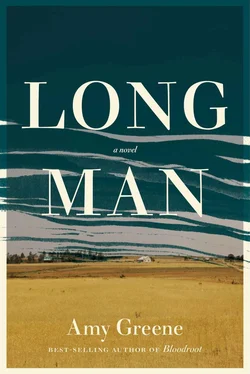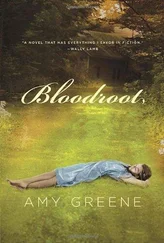In the summer of 1936 there was one woman left on the mountaintop where the river’s headwaters formed in rocks ages old and shining with mica, the sediment washing down to tinge its shoals yellow-brown. Most others with her last name had died or moved on decades ago. Though darkness came to her high place first she could climb to this limestone ridge overlooking the cornfields and see daytime lingering in the valley town below. She would stand shielding her eyes until her legs grew tired. Then she would lower herself to the rocky edge and take off her brogans to rub her sore feet. She would watch with her knees gathered up as the last light mellowed into dusk, falling down the piney bluffs. Before half of the homesteads were razed the lowering sun would stain the tin roofs of houses and barns, deepening the rust to oxblood. Gilding wheat sheaves and tobacco rows, shading red clay furrows. Last summer she might have heard a farmer calling in his cows. She might have heard workers on scaffolds calling to each other over the rumble of cranes and bulldozers, steam shovels gouging the cliffside above the river and dumping out rocks to be crushed for the cement mixer. But now there was only stillness and silence besides the tree frogs singing as twilight drifted toward night. This time next year if she came up here looking for a little more light she would see only miles of endless blue lake.
Long before most of them were run off their land the woman’s neighbors in the valley had stopped seeing her, even when she came down among them. But she kept an eye on them. Looking to the southeast she could see the dam out near the Whitehall County line. It stood over two hundred feet high but from up here it seemed small, wedged between shoulders of limestone with the river wending downstream through the forested humps of the foothills to its base. Standing on the riverbank, it was grand enough to steal her breath. Though the woman’s hair was still dark, her face unwrinkled except at the eye corners, the dam made her feel old. The Methodist preacher claimed it went against nature but there was nothing he or anybody else could do to stop it. It took two years to build, billows of grit from tunneling and excavating bitter in her mouth and dynamite rocking the ground under her feet when she walked to the market. Freight trucks, tractors and the axe men of the clearance crews blocked the road. Behind the power company’s concrete wall, on the upstream side of the river, the water was rising to form a reservoir that would drown the town of Yuneetah.
The woman eavesdropped on the talk of her neighbors. They said it would take a year or longer for the whole town to disappear. But this spring there had been heavy rainfall and the lake was swelling faster than expected. Since the dam gates closed on April 30, water had already moved into the kitchen gardens of the houses nearest the site, soaking into their foundations, tasting the minerals in the boulders settlers had hauled with oxen down from the bluffs in 1786. Soon the growing lake would spread over grassy hillocks dotted with clover and the chicory edging the roadsides. By the end of the year lagoons would be made from clefts in the mountains. Fish would swim in dens once inhabited by foxes. The reservoir would eventually reach sixteen miles wide, spilling across the lowlands the town had occupied since two brothers put up a lean-to shed along the riverbank to trade with the Cherokees and a settlement sprang up around it. The water would keep flooding backward from the base of the dam over acres of farmland and timber, over the Baptist church nestled in a copse of pines, over the Methodist church with its neat white parsonage, over the post office and the druggist’s and Gilley’s Hotel, until it reached the marble steps of the courthouse. By August a hundred families would be evacuated from their dwellings of log, brick, clapboard and stone. Next summer all of Yuneetah would be underwater.
But the woman wasn’t mourning the loss of the town. She had done without neighbors for the better part of her forty-four years and wouldn’t miss them. She was thinking of the apple tree. When the cicadas came each season she remembered it standing in a hayfield old and alone with its fruit. In summer she and her sister used to follow a winding rut down from the hollow and the white-haired farmer would give them a bushel basket to fill. Before the leaves turned this autumn, the tree would be gone. Like her sister. She had managed to forget the others. Her mother whose plaits unloosed swept the ground and her father whose Cherokee blood showed in the glare of the lanterns he carried out hunting. But the memory of her sister stayed with her. For sixteen years they lived together in a house hewn from the timber and bedrock of the mountain. A two-room shack with puncheon floors and a kitchen tacked on the back, the shake roof buried under honeysuckle in summer and the chimney hung with dead vines in winter. At night they lay in each other’s arms with their dark locks blending together, unable to tell where one sister ended and the other began, keeping warm in a nest of blankets and each other’s hair. Until the day the woman’s sister ran off to live with the white-haired farmer and eat all the apples she could hold.
Now the woman had the shack to herself. The last to go had been her grandmother, dead fifteen years. When snakes slithered behind her walls, even copperheads, she let them be. Long combs of wasp nest lined the rafters. She welcomed anything but her own kind. It wasn’t that she trusted the copperheads or wasps more than she did people but animals tended their own business. The woman had chosen her solitude. She liked her house buried in honeysuckle vines that pried into the foundation cracks and wound up the broken windowpanes to make nights sweet in the room where she slept. She liked napping in the heat of the afternoons and making snowshoes for the rambling walks she took when the deep snows came. She had forgotten what hungry meant, growing used to eating no more than it took to keep alive. She had developed a taste for groundhog and muskrat. She had heard about a Depression going on but saw no evidence of it herself. She didn’t understand the power company’s reasoning. She didn’t need electric lights when she could see by the sun and moon. She had the spring and the earth to keep her food from spoiling. She had a washboard for scrubbing clean her dresses. If a person didn’t come to depend on material things, it wouldn’t hurt to lose them. Not like it hurt to lose a sister.
Most of the woman’s kin were buried in the hollow graveyard, but on the farm at the foot of the mountain there lived a three-year-old child with her sister’s face. Last summer the woman had gone barefoot through the dry hayfield weeds with a bushel basket for apples, grasshoppers flying before her. She had found the child playing under the tree with a dog, low boughs crooked around them like leafy arms. If the dog hadn’t barked the woman might have taken the child’s hand and led her to the river where she used to go with her sister. Where the water was broadest a birch leaned over with its roots submerged, touching the surface as if to sip from it. They would scoot along its arched trunk as far as they could to drape themselves over its sturdiest limb, wetting their trailing fingers. Sometimes turtles shared the birch with them, snugged in the algae-bearded forks of its branches, heads tucked in and shells dripping sleek black. In the mornings mist cloaked the river so thick it was hard to see the woods on the opposite bank. If they were still they could watch herons fishing from the rocks. At sundown deer crossed to the other shore, the current rippling out around their velvet brown hides, their white-tipped ears flicked back. The woman had called the child by her sister’s name as they stood in the hayfield with fallen blossoms caught in their hair. Her sister was gone. But for the time being, the child was not.
Читать дальше












